Sunburn remedies from dermatologists
The weather is getting warmer and the days are getting longer. This means you’re more likely to spend time outdoors in the sun. A rule of thumb is to apply sunscreen at least 15 minutes before you go outside, according to the American Academy of Dermatology (AAD). But what happens in those moments where you forget to apply or reapply while you’re out in the sun?
The lack of sun protection can leave your skin vulnerable to sun damage, which can lead to sunburn. Sunburned skin can cause pain and discomfort, and while you may be tempted to cover it up and stay outside, it’s important to find shelter immediately. Although a temporary condition, sunburn can lead to skin damage and raise your risk of skin cancer, reports the AAD.
But when the red sets in, you’re going to need sunburn remedies from the experts: Here’s what dermatologists recommend.
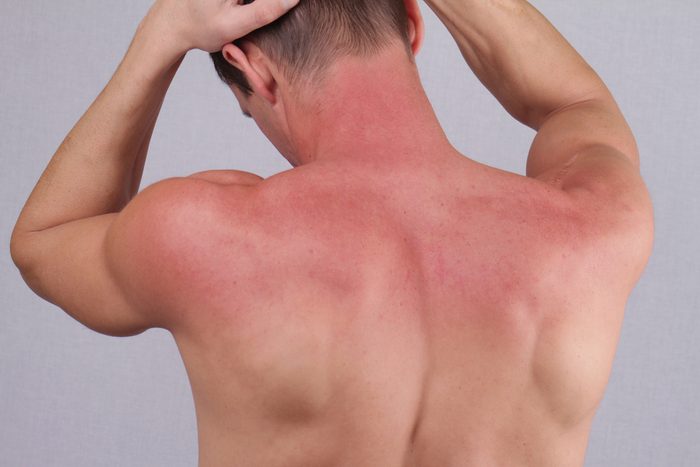
Seek shelter ASAP
It only takes 10 minutes of intense sun exposure for your skin to burn, according to Joel Schlessinger, MD, dermatologist and cosmetic surgeon in Omaha. At the first sign of skin reddening or tingling, he recommends seeking shelter indoors so that you don’t prolong exposure and worsen your sunburn. Too late? Already burned? Read what you should not do after getting a sunburn.
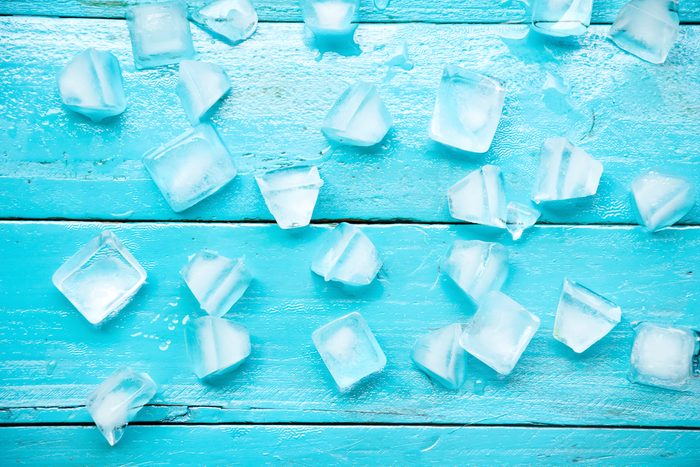
Apply a cool compress immediately
Depending on where you are, you might not have immediate access to a cool compress, such as wrapped ice, to help hydrate your skin and reduce inflammation. At the first opportunity, apply a cool compress lightly to your skin, allowing the heat to evaporate. Ice is great, but Joshua Zeichner, MD, director of cosmetic and clinical research in dermatology at Mount Sinai Hospital in New York City, suggests a milk compress is even better. “Proteins in the milk help cool and soothe the skin,” Dr. Zeichner explains. “Mix skim milk and ice cubes in a bowl and then soak a washcloth in it and apply to the skin for 10 minutes,” he says. If you don’t have milk, he suggests using egg whites as a substitute. Here are 11 more unusual ways to soothe your skin.
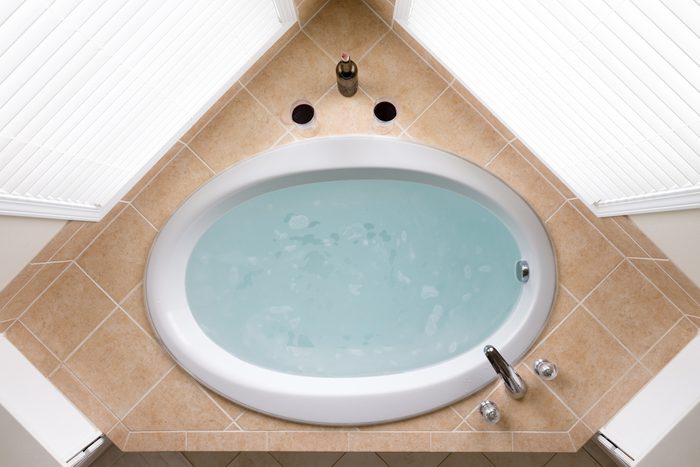
Take a cool shower or bath
A cool rinse will help lower your body temperature, and it should help soothe and comfort your skin. However, says Dr. Schlessinger, avoid scrubs, loofahs, and washcloths, as these could irritate your burn. Instead, he suggests gently massaging a mild cleanser into the skin. “I recommend Vanicream Cleansing Bar, which is free of sulfates, fragrance, dyes, and other common irritants,” he says.
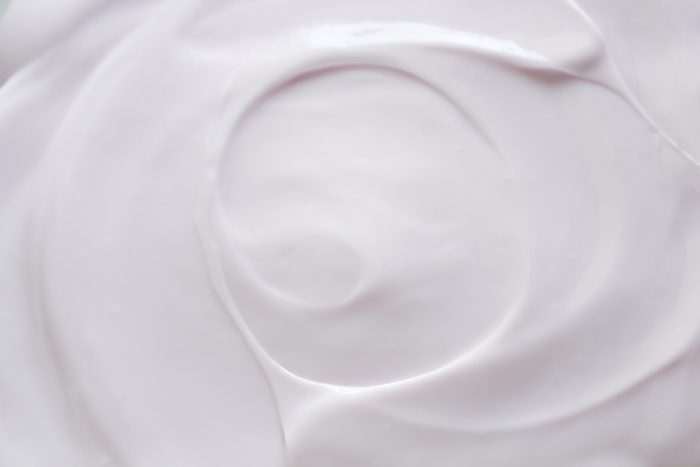
Apply a soothing moisturizer while skin is still damp
“A moisturizing gel or lotion can soothe and comfort skin and minimize the appearance of redness and peeling,” says Dr. Schlessinger. “Formulas that contain aloe vera, vitamin C, and vitamin E may be especially nourishing, but avoid any ingredients that contain petroleum, benzocaine, or lidocaine.” He recommends a lightweight, breathable product instead of heavier creams that can trap heat and keep skin redder longer. Dendy Engelman, MD, a dermatologist at Manhattan Dermatology and Cosmetic Surgery recommends Bio-Oil Multiuse Skincare Oil because it contains vitamin E to neutralize free radicals and promote cell regeneration. Here are dermatologists’ 8 rules for using moisturizer.
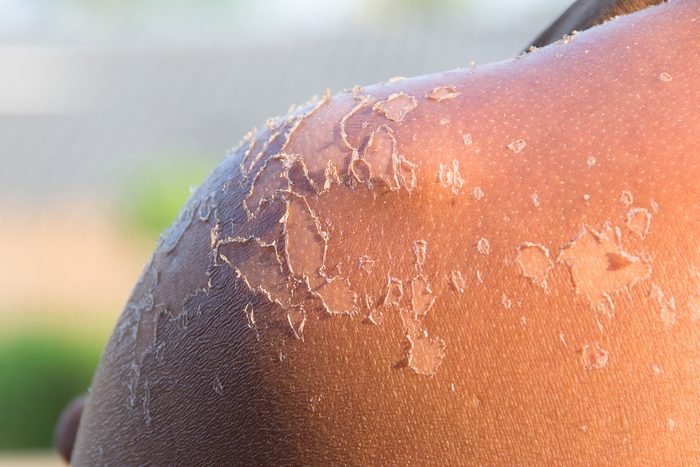
Avoid popping blisters at all costs
Never pick at flaky skin or blisters. If you develop blisters, Jerome Garden, MD, the director of the Physicians Laser and Dermatology Institute in Chicago, recommends allowing them to heal by themselves for a speedier recovery. (Check out the signs of an infected cut or scrape you should never ignore.)
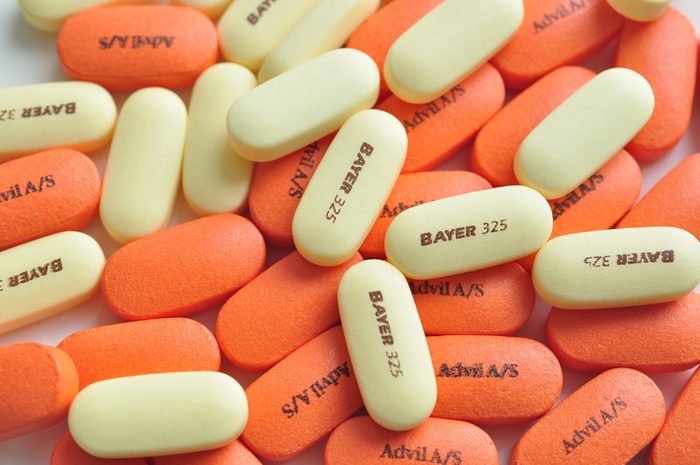
Take an anti-inflammatory medication
Taking the recommended dose of an over-the-counter anti-inflammatory such as Advil or Motrin can help alleviate the pain, according to Dr. Schlessinger. “When you take ibuprofen, you aren’t just addressing symptoms like redness and swelling, you are also helping to prevent long-term skin damage,” he says. “For best results, take ibuprofen within four to six hours of sunburn to prevent it from becoming worse and continue taking it as directed for the next 48 hours.” Here are 13 anti-inflammatory foods for fighting pain.
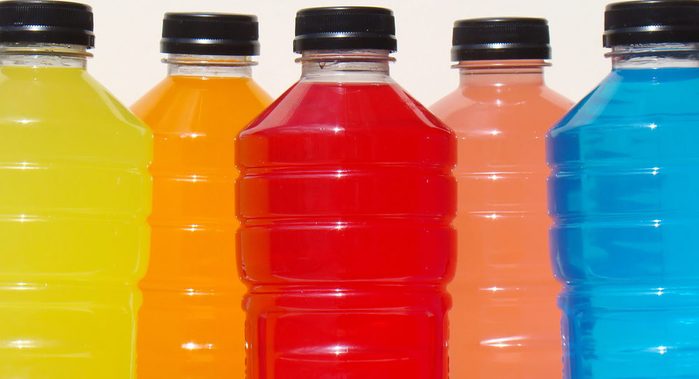
Stay hydrated
As a sunburn dries out your skin, it’s important to drink as much water as possible to prevent dehydration. “Sunburn draws fluid to the skin’s surface and away from other areas of the body,” explains Dr. Schlessinger. While water is the gold-standard beverage for hydration, sports drinks can also help your body recover electrolytes, he adds. Check out these clever ways to stay hydrated.
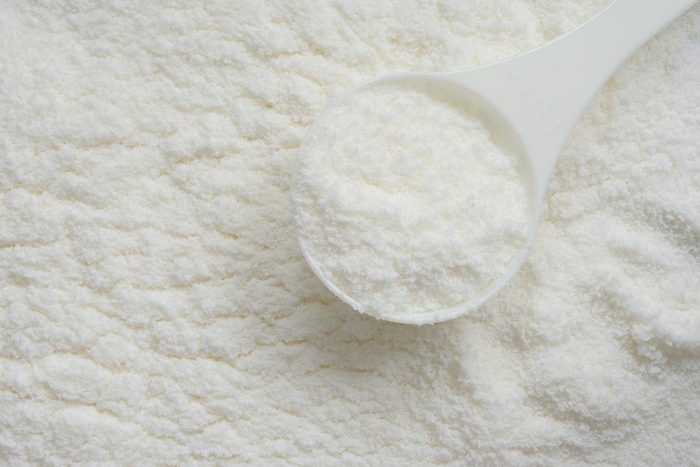
Take oral supplements
Some supplements can help support the body’s healing process, Dr. Engelman explains. “After a sunburn, the skin is in repair mode and a collagen supplement can help expedite the healing,” she says. Dr. Engelman prefers pills and powders because they are easy to incorporate no matter what your lifestyle. Her go-to is Reserveage Collagen Replenish Powder. But the most important things you can do happen before sun exposure. Did you know that if you exfoliate regularly it increases your chances of getting sunburn? Learn more about bizarre causes of sunburn. You can consider adding in polypodium leucotomos supplements that help protect the skin against UVA damage. (Read more about collagen powder benefits.)
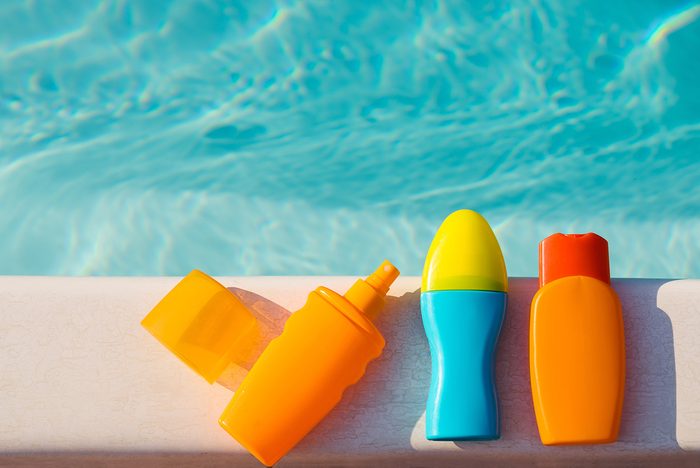
Use sunscreen even if you’re not planning on being in the sun
The last thing you want to do is make your skin worse: Wear a broad-spectrum sunscreen throughout the day and reapply it regularly, says Dr. Schlessinger: “You may not feel like you’re getting sun, but up to 80 percent of the sun’s rays can penetrate through clouds.” He recommends EltaMD sunscreens as well as Jane Iredale Powder-Me SPF Dry Sunscreen SPF 30 for those who need to reapply sunscreen throughout the day, especially over makeup.
Avoid anything that’ll worsen your sunburn
Preventive care is key, so Dr. Engelman urges patients to wear protective clothing. “Your skin is in a vulnerable state, so stay away from any glittery products or exfoliators that would cause damage to your weakened skin barrier,” she says. “Also avoid ingredients that dry the skin, like fragrance, alcohol, menthol, witch hazel, and more.” Watch out for these 12 toxic ingredients in beauty products.
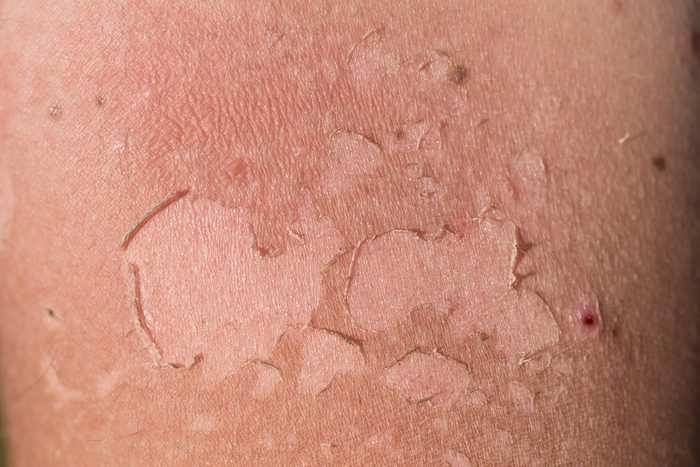
See a doctor if redness or pain persists
If you’re still battling severe pain and redness after a couple of days—especially if you still have blisters—make an appointment with your dermatologist (here are some more signs you need to see a skin doctor). “If you have any open skin, your dermatologist can give you prescription medications to prevent infection and ensure that the skin heals up as best it can,” says Dr. Zeichner.
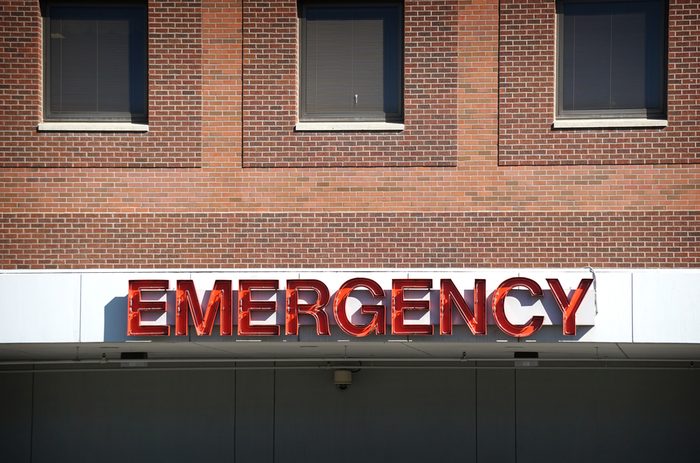
Visit the ER if you develop fever or chills
If you’re feeling feverish or fuzzy-headed and over-the-counter medications aren’t helping, be safe and not sorry and visit your local ER. Additional reasons to seek medical help include blisters on your face, lips, eyelids, hands, or feet, or blisters covering large areas of your body, says to Tsippora Shainhouse, MD, a dermatologist in Los Angeles. In addition, hives, wheezing or facial swelling, nausea, vomiting are red flags, as are signs of dehydration, which include weakness, headaches, dizziness, or confusion, she adds. Don’t miss the silent signs of sun poisoning you should know about.

